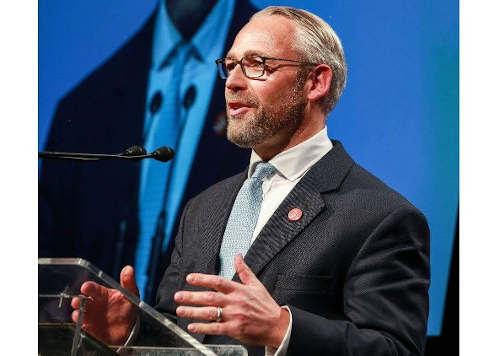Jim Bichard, Global Insurance Leader for PwC, has urged the insurance and reinsurance industry to seek bolder collaboration with governments and public bodies to handle the largest risks facing the market.
 Speaking to Reinsurance News at the recent RVS 2022 event in Monte Carlo, Bichard discussed the main trends and challenges currently impacting reinsurers, and how the market can adapt and respond.
Speaking to Reinsurance News at the recent RVS 2022 event in Monte Carlo, Bichard discussed the main trends and challenges currently impacting reinsurers, and how the market can adapt and respond.
With so much volatility present in the global macroeconomic environment, discussions at the key Monaco conference inevitably focused more on the immediate threats of inflation and geopolitical instability than on more systemic issues such as climate change.
But Bichard still felt that reinsurers have made good progress in recent years in bringing climate risk more prominently onto its agenda.
The physical risk of climate change in particular has garnered attention due to the growing threats of perils like drought, wildfire, flooding and storms, even in areas where these threats had not previously been expected or priced in.
“You wouldn’t have thought you’d be having drought related losses in the UK, or Northern Europe, for instance,” Bichard said, referring to the impact of the extreme weather this summer. “You wouldn’t have necessarily had that in your risk appetite. So the industry has been pretty clear that climate risk has increased, and that has had an impact on losses.”
But when it comes to the market’s ability to respond to these risks, Bichard was sceptical about whether it’s possible for private reinsurance capital to meet the challenge alone.
“It’s hard to imagine that these big problems can be handled without public-private partnerships. They’re just too big,” Bichard told Reinsurance News. But the second part of that would be how good is the industry at working with public bodies, whether it’s government or government agencies.”
“If you think of climate as an existential risk, then there’s got to be a role for government,” he continued. “There isn’t enough capital, even if we do an amazing job of bringing a lot of capital into the market to deal with it. So I definitely think there’s a role to play for government. But we’re not very good at talking with one voice and clubbing together to work with government.”
For Bichard, systemic risks such as climate change and pandemic feel like they have “no boundaries” in terms of the potential for losses, both in terms of their geographical impact and the lines of business where reinsurers could find themselves exposed.
“It’s almost impossible to contain it,” he asserted. “It’s almost an infinite amount of risk. I don’t think the insurance industry can cover all of that.”
However, the PwC executive was more hesitant to place cyber into the same category, despite its frequent categorisation as a ‘systemic’ risk.
“Rightly or wrongly, I don’t see cyber as systemic. Cyber has the potential to be incredibly severe. And the losses can be multi-territory. But I still think you can put your arms around it to a degree,” Bichard explained.
“It will only get bigger as technology becomes a bigger part of what we do,” he added. “But it doesn’t feel like it’s a different type of risk altogether than the physical risk.”


